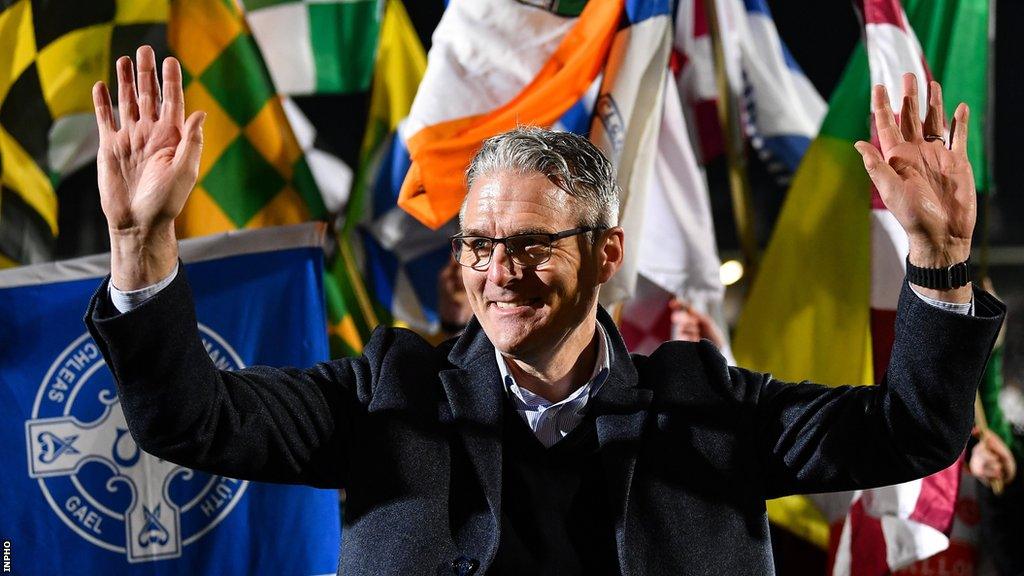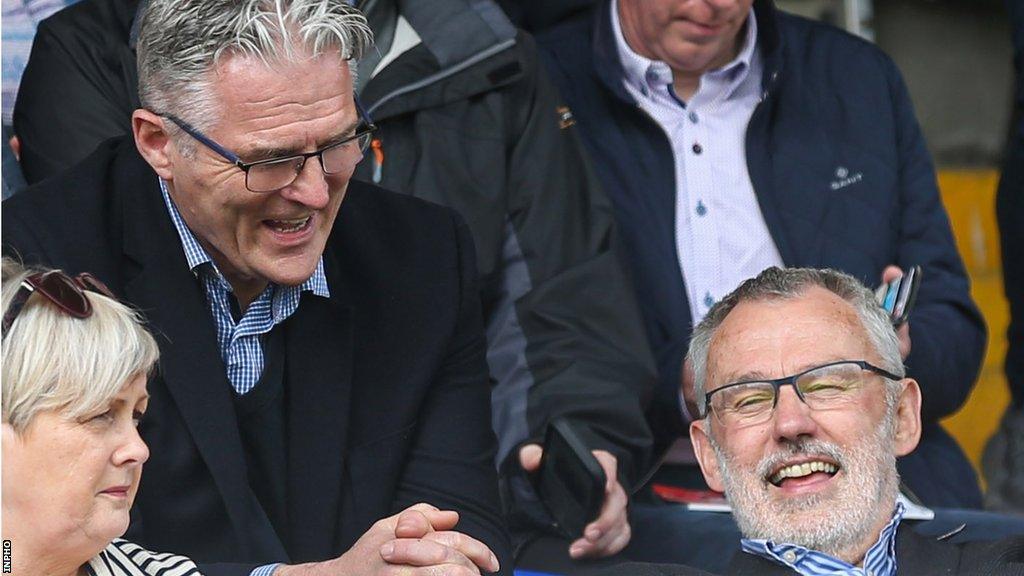Jarlath Burns: Armagh man assumes GAA presidency that always seemed his destiny
- Published

Jarlath Burns served in numerous club, county and Croke Park committee roles after his Armagh inter-county career ended in 1999
Jarlath Burns assumed a GAA presidency in Newry on Saturday that looked his destiny from his inter-county playing days with Armagh.
The Silverbridge man's intelligence was obvious from the first conversation you had with him and his ability to articulate his point of view made him a go-to man when journalists were seeking stories on the largely underachieving Armagh footballers during the early and mid-1990s.
On the field, Burns soldiered on in the Orange jersey for 13 seasons until his moment in the sun finally arrived in 1999 at Clones when he captained his beloved county to a first Ulster Football title in 17 years.
His decision a few months later to retire from inter-county football at the age of 31 not long after an admittedly disappointing All-Ireland semi-final defeat by Meath surprised many as he appeared to have plenty left to give.
Three years later, Burns, the TV pundit, left an empty chair in the BBC Sport Northern Ireland studio at Croke Park as he ran on to the pitch to join in the celebrations of Armagh's first All-Ireland triumph.
By that stage, he had already stepped on to the ladder of officialdom at Croke Park after being appointed as the first ever players representative to the GAA's Central Council in 2000.
In 2009, Burns was entrusted with chairing the committee that organised events to celebrate the association's 125th anniversary while he served as a member of both the Armagh and Ulster GAA management committees.
Jarlath Burns: GAA president-elect on the GAA Social
'Fascinated by unionist culture'
In 2010, he began a five-year term as the Armagh county board's delegate to the Central Council while he later chaired the committee which came up with new football playing rules that included the mark.
All the while, Burns held senior roles within his own Silverbridge club in south Armagh, which included stints as secretary and chairman, even though he also had a busy working life with him being promoted to principal of St Paul's High School Bessbrook in 2013 after being vice-principal at one of the largest post-primary schools in Ireland.
Away from his working and GAA commitments, Burns was one of the representatives on the Northern Ireland Consultative Group on the Past, jointly chaired by former Church of Ireland Primate of Ireland and Archbishop of Armagh Robin Eames and Denis Bradley, which was established in 2007 and delivered its report two years later.
Burns is a man who has often spoken about his fascination and interest about British and unionist culture and told The GAA Social podcast last year of how "the Orange Order are in our school all the time talking to our young people, trying to get them to understand what that [unionist culture] is about, what parading is about".
He made his first tilt at the GAA presidency in 2020 after being proposed by his own county but despite running a strong campaign and being fancied to land the role, he was beaten in a tight vote by New York delegate Larry McCarthy, who became the GAA's first overseas president.

Jarlath Burns succeeds Larry McCarthy who narrowly beat the Armagh man in the GAA presidential election in 2020
The Armagh man described McCarthy's election as a "wonderful achievement for the GAA" but while he offered heartiest congratulations to the Cork native, his own disappointment was palpable.
However in November 2022, Burns launched another attempt to land the presidency and success was his at last year's Annual Congress when he was elected on the first count after getting 158 of the 277 votes to become the first Armagh man to be handed the role since Alf Murray's 1964 to 1967 term.
"This is Silverbridge's night tonight," said an emotional Burns as he was embraced by wife Suzanne and sons Conall and Jarlath Og, who has followed in his footsteps by playing for Armagh.
"We had two hours to wait between the count and the announcement. There was all sorts of speculation, but you almost enter a surreal world in those two hours.
"It's certainly not something I would want to go through again but when you see how emphatic the victory was then you realise it was worth waiting for," added the fluent Irish speaker who has undertaken regular GAA co-commentary duties with TG4.
In-tray includes integration deadline
Since then, Burns, as any protocol-observing GAA President-elect, has remained largely in the background and was even spotted at the Athletic Grounds last year wearing a high-vis jacket in a volunteer stewards role.
But he has to hit the ground running after becoming the association's 41st president at Saturday's Congress session in the Canal Court Hotel.
His in-tray is going to be full and his renowned diplomatic and conciliatory tones will be required to help steer the GAA towards full integration with camogie and ladies football by the 2027 target date, which happens to be the year his presidency concludes.
Former Irish president Mary McAleese is driving the project and one suspects, her relationship with Burns will prove vital over the next three years in ensuring that integration of the three GAA bodies becomes a reality.
Prior to his first presidential bid, Burns spoke of the "juggernaut" of spending on inter-county teams which exceeded 40m Euro in 2023 and even knowing where to start in terms of tackling that and indeed the issue of brown envelope payments to club managers may already have given the Silverbridge man sleepless nights.
Other issues that he will have to be at least seen to tackle include promoting hurling in the weaker counties while Burns and director general Tom Ryan will also have to deal with increasing calls for the GAA to come up with considerably more than the £15m it has committed to the Casement Park rebuild amid the project's spiralling costs.
As the 56-year-old Armagh man takes a sabbatical from his school principal's role during his three-year term, he will be logging the miles as he travels around the island and indeed abroad to meet the Irish diaspora.
However, this looks a GAA presidency that will be stretched far beyond the ceremonial as he becomes the first man from north of the border to serve in the role since Peter Quinn in the early 1990s.